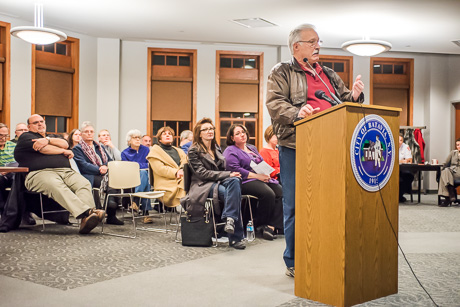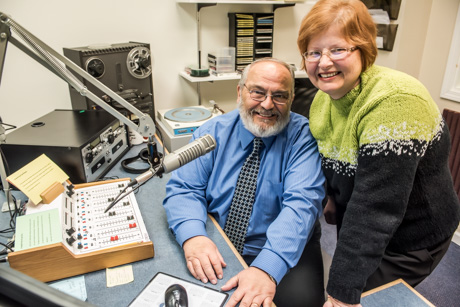Frost Ridge Campground owner David Luetticke-Archbell embraces campground manager Janet Whitney — popularly known as “Miss Gabby” — after the joint Le Roy Zoning Board of Appeals issued a decision in favor of the campground Wednesday night.
The long battle is over, and won, for Frost Ridge Campground.
The Le Roy Zoning Board of Appeals on Wednesday ruled in favor of Frost Ridge, finding it a prior nonconforming use. The ZBA determined that “ambiguity” in the town zoning law, leaves room for camping and “attendant recreational activities” including live concerts.
That brings to an apparent close, a three-year legal battle over the Conlon Road facility.
Frost Ridge owner David Lueticke-Archbell was visibly relieved after ZBA Chairperson Debbi Jackett read the decision during a brief meeting in Town Court.
“Wow,” Lueticke-Archbell said. “Wow.”
“I’m so thankful that (the ZBA) took the proper time to really research it and come up with a decision that fit with what was legally right,” he said.
The Frost Ridge site has been used as a campground for decades. David and Greg Luetticke-Archbell have owned the the property since 2008, and have been hosting outdoor concerts there since 2012.
In 2013, the ZBA determined that the concerts are allowable under town zoning law. That decision prompted court challenges by neighbors and the Town of Le Roy. Last April, Supreme Court Judge Robert Noonan invalidated the ZBA’s ruling on technical grounds, and ordered a new public hearing.
That hearing was finally held on Dec. 17, 2015. After 90 minutes of testimony, Jackett said the ZBA would issue its ruling within the legally allowable 62 days — a deadline met on Wednesday.
David Luetticke-Archbell described the experience as a “roller coaster.”
“It’s been difficult,” he said. “The main thing, for me, is I felt like we haven’t been able to service our guests well during this time — not as well as we normally would.”
For Luetticke-Archbell, Wednesday marked the end of one chapter, and the start of another.
“For the legal stuff, this should be the end of the road,” he said. “And, God willing, that will offer some opportunities that we can do this in a way everybody can be happy with.”
Luetticke-Archbell said he would work with his attorney, to make sure the campground runs “by the book.”
“This is about people going on vacation and enjoying themselves,” he said. “We want to make sure everything we do is within the confines of what is allowable.”
Town Supervisor Stephen Barbeau has said the Town Board would abide by a ZBA determination that follows a formal application and public hearing. Wednesday night, he said the Town Board will not be discussing the ZBA ruling.
Neighbors who might disagree with Wednesday’s ruling, are however free to challenge it in court, he said.
About 20 people attended Wednesday’s meeting, many of them Frost Ridge supporters who applauded after Jackett spoke.
The meeting was scheduled for 7:30 p.m., and was officially adjourned at 7:38 p.m. Board members did not accept questions.
———
The ZBA ruling is an interpretation of two sections of town zoning law: Section 165-13, “Nonconforming uses, lots and structures”; and Section 165-39(B), which regards campsites. The following, is a partial transcript of the ruling as read by Chairperson Debbi Jackett:
We, the Le Roy joint Zoning Board of Appeals, conducted a hearing on Dec. 17, 2015, at 7:30 p.m. at the Le Roy Town Hall … The purpose of the hearing was in response to the application for interpretation filed by David Luetticke-Archbell as agent of applicant Frost Ridge Campground LLC, located at 8101 Conlon Rd. in the Town of Le Roy, N.Y. …
The application particularly requested an interpretation of whether zoning code of the Town of Le Roy allows for camping and attendant recreational activities including live and recorded amplified music, concerts and limited food service at the property as a prior, nonconforming use under Section 165-13 and, or likewise, as an exempt campground under Section 165-39(B)
The board notes this application is the first written request furnished by the applicant to this board.
We find that sections 165-13 and 165-39(B) of the zoning code of the Town of Le Roy, have ambiguity regarding the activities of the applicant on the property. We therefore interpret the zoning code of the Town of Le Roy does allow for camping and attendant recreational activities including live and recorded amplified music, concerts and limited food service at the property and is a prior nonconforming use under the aforementioned sections. We further direct that the complete written decision be field in the office of the the Town Clerk within five business days.






